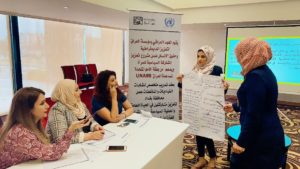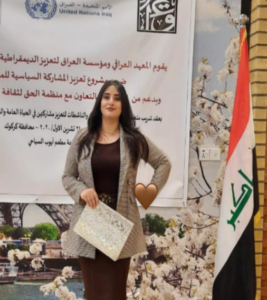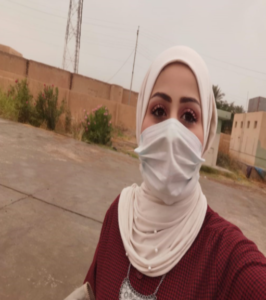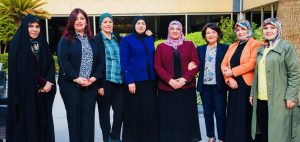Strengthening Women’s Political Participation in Iraq
Funded By The United Nations Assistance Mission to Iraq (UNAMI)
Phase One October 1, 2019 – February 15, 2020
Phase Two April 1, 2020 – November 15, 2020
Phase Three April 1, 2021 – January 31, 2022
Phase Four January 1, 2022 – December 31, 2022
The participation of women in political and electoral processes in Iraq has been hampered by numerous factors, despite Iraqi women’s determination to engage in the public sphere. The United Nations Assistance Mission for Iraq (UNAMI), the Iraq Foundation and the Economic and Social Commission for Western Asia (ESCWA) conducted research between October 2019 and February 2020 aimed at documenting and understanding the challenges and unmet needs of women who run for elected public office. Five governorates, namely Baghdad, Basra, Ninewa, Najaf and Salah Al Din, were selected for assessment because they offer representative diversity in terms of demographic, social and political environments.


Shatha Saif Addeen Al Dawoudi 25 year old Kirkuk Province B.A in law from the University of Kirkuk “I am one of the trainees in the training workshop that addressed women’s political participation. I benefited a great deal from the workshop: I acquired strength, will power, perseverance, and courage, and learned that women have a heard voice and strength. From this strength and drive, I now have the ability strive to become a leader and participate in the political process. Although I am a lawyer, I lacked a lot (of skills), and now with this training I believe I am on the right path.”

Tamara Khalil 27 years old Salaheddin Province, B.A. Accounting “It was an exceptional training workshop. I wasn’t anticipating being accepted but fortunately I was selected, and I did very well. I benefited a lot and I gained knowledge and skills in leadership, advocacy, and media presence. After I completed my training I met with a number of NGOs, and I was selected as a coordinator for a program that trains election monitors for 2021, implemented by the Peace and Freedom Organization. Thank you for granting me this opportunity!”
Phase 1: October 1, 2019 – February 15, 2020
Reports:
- Women Running for Elected Offices in Iraq: Needs and Challenges – Executive Summary-En
- Women Running for Elected Offices in Iraq: Needs and Challenges – Executive-Summary-Ar
- Women Running for Elected Offices in Iraq: Needs and Challenges-En
- Women Running for Elected Offices in Iraq: Needs and Challenges-Ar
- Phase-1-Narative-Report
Phase 2: April 1, 2020 – November 15, 2021
Reports:
- Promoting Women’s Political Participation in Iraq-Policy Brief-En
- Promoting Women’s Political Participation in Iraq-Policy Brief-Ar
- Phase 2 Narrative-Report
Election Watch: Assisting women candidates to
Counter gender-based violence and hate speech
During the election campaign
Funded by the United Nations Assistance Mission to Iraq (UNAMI)
Phase Three – April 1, 2021 – January 31, 2022
In the period leading up to the parliamentary elections of May 2018, the first since ISIS’s defeat, women candidates faced such unprecedented levels of harassment and violence, particularly through attacks on social media, that some women were forced to drop out of the race. Such extensive violence against women in elections led the UN Secretary General’s Special Representative for Iraq, Jan Kubis, to publicly condemn these acts and encourage women to continue their race:
“Those behind defamation, cyber bullying and harassment are trying to scare you off, afraid of educated, dynamic, qualified, courageous and open-minded women candidates that rightfully claim their space and meaningful role in political life of Iraq.”
In 2019, the UN recognized the global spread of hate speech as a “menace to democratic values, social stability and peace” and adopted the UN Strategy and Plan of Action on Hate Speech. The Strategy defines the term as “any kind of communication in speech, writing or behavior, that attacks or uses pejorative and discriminatory language with reference to a person or a group on the basis of who they are, in other words, based on their religion, ethnicity, nationality, race, color, descent, gender or other identity factor.”
In order to help women candidates for elected office and civil society groups counter hate speech and gender-based violence (GBV) during the election campaign, IF implemented the Election Watch: Assisting women candidates to counter gender-based violence and hate speech during the election campaign project from May 1, 2021, through January 31, 2022. This project focused on GBV and hate speech against women candidates for elected office in Iraq during the campaign period leading up to the October 2021 Parliamentary election in Iraq. By aiming to publicize GBV and hate speech occurrences against women candidates during the election campaign and analyzing patterns and trends to formulate recommendations on how to prevent and mitigate gender-based harassment against women candidates, the project aligned with two key UN Policy Directives: Promoting Women’s Electoral and Political Participation (2013), and Preventing and Mitigating Election-Related Violence (2016).
The project built upon the results of IF’s two-phase project with UNAMI on Strengthening Women’s Political Participation (2019-2020), and especially on the findings of the Needs Assessment Report of Phase One, ‘Women Running for Elected Office in Iraq: Needs and Challenges’, that was submitted to UNAMI in March 2020
Reports:
Phase Four – January 1, 2022 – December 31, 2022
The project aims to conduct a gender audit of political parties in Iraq to evaluate their gender policies and practices and develop recommendations to improve meaningful political participation. The project will conduct a desk review of available documents from political parties, legislation, and the Independent High Election Commission (IHEC) and set them against recognized “best practices”. The project will develop targeted questionnaires and conduct interviews with political party leaders, women candidates in the 2021 parliamentary elections, IHEC, the Directorate of Women’s Empowerment, and other stakeholders. This will result in the report of findings and recommendations on ways that political parties, parliament, and IHEC can strengthen the meaningful contribution of women to the political process. IF will Conduct 3 workshops targeting IHEC, the Council of Representatives, Political Parties/Blocs and other relevant actors/institutions to share the report and identify action items and institutional commitments for inclusion in the final advocacy brief. Finally, a final advocacy brief will be launched at a plenary session.





